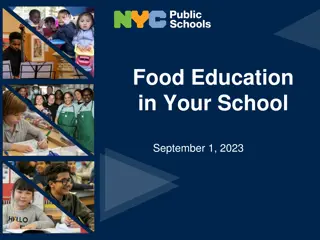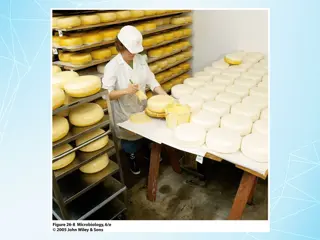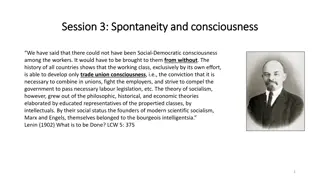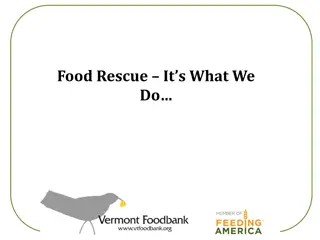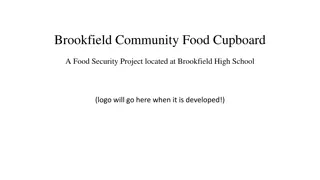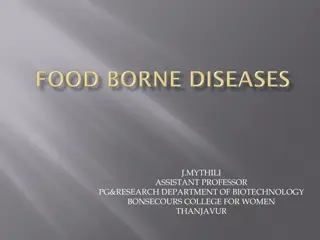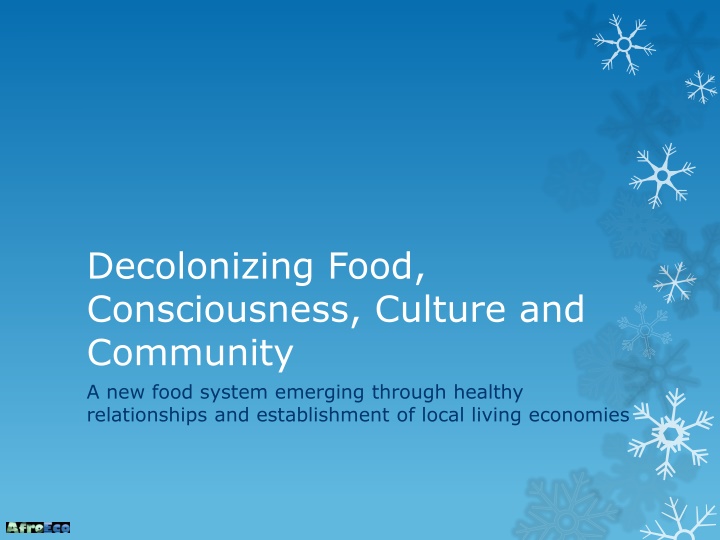
Emergence of Decolonized Food Systems Through Local Economies
Explore the concept of decolonizing food, consciousness, culture, and community to establish a new food system based on healthy relationships and local living economies. Understand the importance of decolonization in food sovereignty and shifting towards a more communal and sustainable approach. Learn how disruptions in the industrial food system impact communities and the significance of local resilience organizing in creating a more equitable and healthy food environment.
Download Presentation

Please find below an Image/Link to download the presentation.
The content on the website is provided AS IS for your information and personal use only. It may not be sold, licensed, or shared on other websites without obtaining consent from the author. If you encounter any issues during the download, it is possible that the publisher has removed the file from their server.
You are allowed to download the files provided on this website for personal or commercial use, subject to the condition that they are used lawfully. All files are the property of their respective owners.
The content on the website is provided AS IS for your information and personal use only. It may not be sold, licensed, or shared on other websites without obtaining consent from the author.
E N D
Presentation Transcript
Decolonizing Food, Consciousness, Culture and Community A new food system emerging through healthy relationships and establishment of local living economies
Decolonize? Yes! Colonialism destroys the autonomy of communities for self determination around food, health, economy, public policy, livelihood. Decolonizing is a necessary aspect of the food sovereignty approach, which is not so well established in the U.S. or global north context. Afro Eco suggests this framework is increasingly relevant here and now.
Decolonizing What to Decolonize? Food How to Decolonize We believe it is possible to significantly increase consumption of 5 or more servings of fresh fruit and vegetables per day from local sources. Consciousness We believe we can shift consciousness from an individualist survival orientation toward coherence around sharing livelihood locally. Culture Consciousness shift happens in the context of a culture shift through which people transform the industrial paradigm based on domination of nature and destruction of community toward local self determination, partnership and regenerative relationship Community From our current apartheid, we push for a relational turn, in which people in the community recognize that our fates are woven, so our processes of livelihood must be interwoven. Together, we create wealth where there is poverty, health where there is disease. Land In order to succeed we need to assert community ownership of a significant portion of the land base. If the way we use land separates us, the way we live our lives will separate us further. Land Trusts and Agricultural Trusts are an important component of decolonizing
Industrial Food System as Colonial Food System
Ruptures and Disruptions Ruptures Displacement from land Destruction of local food ways Disruptions It takes us longer in poor communities to purchase more expensive and worse food The food disrupts the healthy functioning of our bodies The combination of bad food, unemployment, mass incarceration, poverty, environmental contaminants, failing equalizing institutions, neoliberal economic policy keep us in a constant state of disruption (root shock) Privatization Ecological Imperialism invades indigenous ecosystems The economy is designed for others at our expense. We have little to no voice in the political economy of the industrial food system
Local Resilience Organizing as (potentially) de-colonizing Local living economy organizing Local food production Community and Environmental Health Partnerships
Whats living New local/cultural foods restuarant Increasing connections and consciousness about local food and community health through the food system New food coop Sustainable Food labs bring community together to nourish radical imagination Growth of farmers markets and CSAs Community Coalition organizing to co- produce community health and wealth Growing food on more than 35 market gardens 16 local black farmers now certified urban farmers
Whats next? Facilitation of prototype of local living economy Land Deeper organizing trust/agricultural trust Citizen Ecological Science, developing and deepening a local ecological knowledge system Policy framework to defend/promote community food system/s
thanks Lets De-Colonize!!!!!!!!

